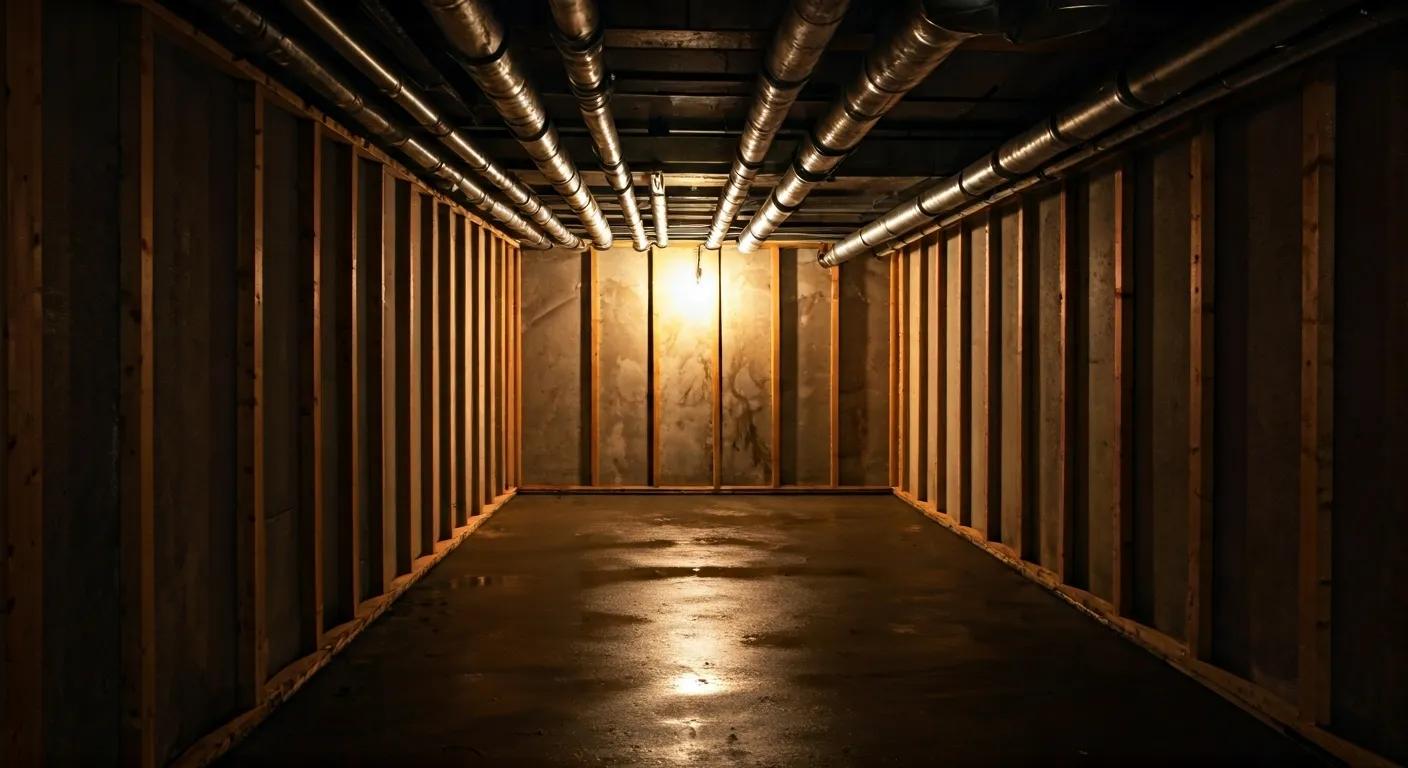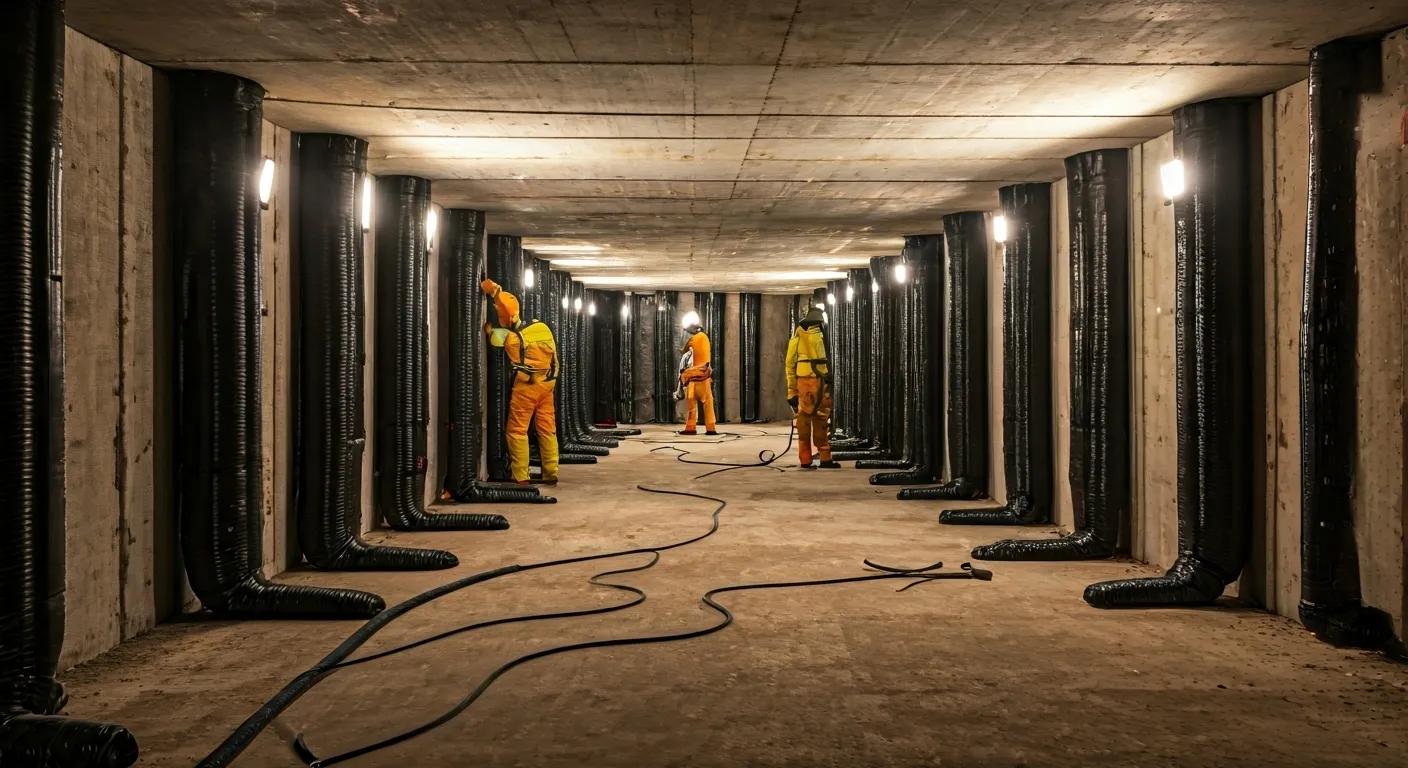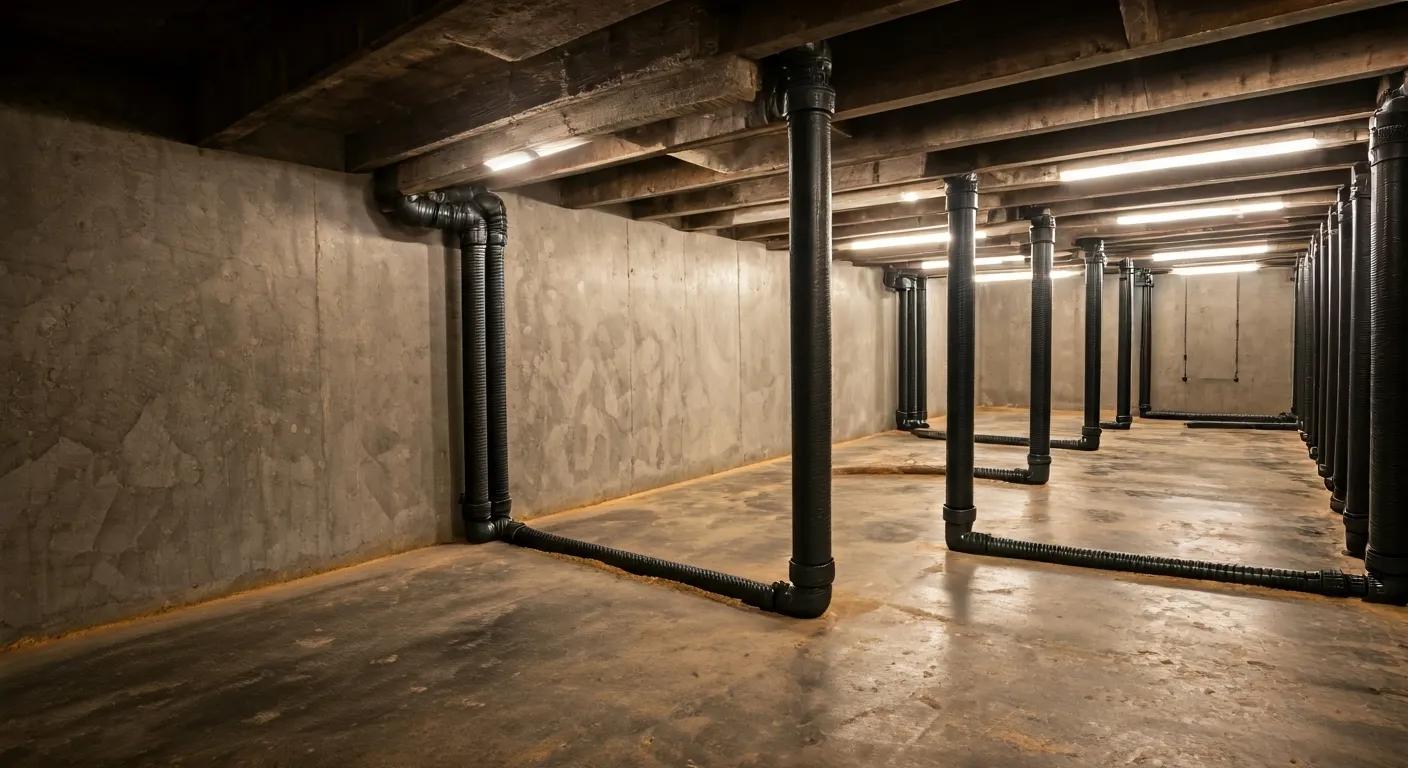Identifying Basement Flooding Causes in Rockford IL
Basement flooding is a critical issue for homeowners and commercial property owners in Rockford, IL. At ABC Basement Waterproofing Rockford IL, we understand that protecting your home’s foundation and keeping your basement dry is paramount. Water intrusion can lead to structural damage, mold, mildew, and long-term degradation. Flooding may result from heavy rainfall, poor drainage, foundation cracks, or adverse soil conditions. In this article, we explain the common causes of basement flooding, early warning signs, preventive methods, and repair solutions to safeguard your home and investment.
What Are the Most Common Causes of Basement Flooding in Rockford IL?
Environmental and structural factors can cause basement flooding. The main causes include heavy rainfall and snowmelt, inefficient drainage systems, foundation cracks and leaks, adverse soil conditions, and clogged gutters. Often, these factors work together, worsening water damage if not addressed promptly.
How Does Heavy Rainfall and Snowmelt Contribute to Basement Flooding?
Heavy rain and rapid snowmelt dramatically increase water volume around your home, overwhelming drainage systems. Prolonged rain or quick melting causes the soil to saturate, forcing excess water to accumulate around the foundation. Without proper grading to direct water away, even small cracks allow water to seep into the basement.
In Rockford, IL, seasonal changes can cause rainstorms to quickly follow snow events. Our team emphasizes the need for robust exterior drainage, proper grading, and regular inspections of roofing, gutters, and downspouts to relieve the pressure on the foundation.
Why Is Poor Drainage a Leading Cause of Basement Water Issues?
Poor drainage systems fail to direct water away from your foundation, resulting in pooling and increased hydrostatic pressure. Clogged gutters and improperly directed downspouts worsen the issue by allowing water to overflow near the foundation, seeping into the basement through any weak spots. Regular cleaning and maintenance, along with french drain installation and proper grading, are essential to avoid these problems.
How Do Foundation Cracks and Leaks Lead to Basement Flooding?
Even small cracks in the foundation—caused by settling, thermal expansion, or prior damage—can serve as channels for water entry. As water pressure increases, these cracks can lead to unexpected flooding. Regular inspections and timely repairs, such as epoxy or polyurethane injections, help strengthen the foundation and prevent costly damage.
What Role Do Soil Conditions and the Water Table Play in Flooding?
Soil type and water table levels considerably influence basement flooding risk. Clay soils retain water and create high hydrostatic pressure, while sandy soils drain more effectively. A high water table further pushes water toward the foundation. Evaluating soil properties and monitoring seasonal water table fluctuations, along with measures like sub-slab drainage and soil waterproofing chemicals, can minimize these risks.
How Do Clogged Gutters and Downspouts Cause Basement Water Damage?
When gutters and downspouts are clogged with leaves and debris, water overflows instead of being directed away from the foundation. This results in water pooling that exerts pressure on the basement walls. Regular maintenance, extending downspouts away from the house, and using gutter guards are key practices to prevent water damage.
How Can Homeowners Identify Early Signs of Basement Flooding in Rockford?

Early detection is crucial to prevent major damage. Homeowners should watch for visible water stains, discoloration on walls and floors, musty odors, and signs of mold. These indicators suggest water is entering the basement, and immediate inspection can help mitigate extensive damage.
What Are Visible Indicators of Water Intrusion in Basements?
Indicators include water stains, peeling paint, efflorescence, and damp patches. Condensation on pipes or windows and an unusual increase in humidity may also reveal hidden leaks. Early detection and prompt repair can reduce the need for costly restoration later.
How Does Moisture and Mold Growth Signal Flooding Risks?
Persistent moisture creates an ideal environment for mold growth, which can occur within 24 to 48 hours of water exposure. The appearance of mold, accompanied by a musty odor, signals that water is trapped and could be causing structural damage. Addressing these issues early with improved ventilation, dehumidifiers, and proper waterproofing helps prevent further damage and health risks.
When Should You Inspect Foundation and Drainage Systems?
We recommend inspecting your basement and drainage systems at least twice a year—before the rainy season and after winter. Early detection of cracks, leaks, or improper grading allows for timely professional repairs, reducing the risk of severe damage.
What Prevention Methods Effectively Address Basement Flooding Causes in Rockford?
Preventing basement flooding requires addressing root causes rather than merely treating symptoms. Effective prevention methods include installing waterproofing systems, maintaining drainage components, and ensuring proper exterior grading and gutter maintenance.
How Do Waterproofing Systems Protect Basements From Water Damage?
Waterproofing systems create a robust barrier that prevents water from reaching the basement’s interior. These systems use coatings, membranes, or sealants on the exterior foundation, while interior methods—like water-resistant paints—complement by sealing walls and floors. Our comprehensive approach combines both external and internal methods to guard against water intrusion.
Why Is Sump Pump Installation Crucial for Flood Prevention?
A sump pump is essential because it actively removes accumulated water from the basement during heavy rain or rapid snowmelt. Installed at the lowest point of the basement, the pump sends water away from the foundation, reducing hydrostatic pressure and the risk of flooding. Regular testing and professional maintenance ensure optimal performance.
How Does Proper Grading and Exterior Drainage Reduce Flood Risks?
Proper grading directs water away from the foundation by ensuring the ground slopes outward. Combined with exterior drainage systems like french drains, this method minimizes water pooling. Regularly inspecting and correcting grading, along with maintaining gutters and downspouts, is a practical approach to reduce basement flooding risk.
What Are Best Practices for Gutter Cleaning and Maintenance?
Routine gutter cleaning—ideally twice a year—is essential. This practice ensures that rainwater flows freely through downspouts, which should extend several feet from the foundation. Using gutter guards can further minimize debris build-up and help maintain an efficient drainage system.
How Often Should Regular Inspections Be Conducted to Prevent Flooding?
Regular inspections (at least twice a year, plus after severe weather) help identify potential vulnerabilities in your foundation, drainage systems, and gutters. Professional inspections using moisture detection and thermal imaging can uncover hidden leaks and allow for prompt repair, reducing long-term risks.
What Are the Most Effective Solutions for Repairing Flooded Basements in Rockford?

When basement flooding occurs, prompt repair is critical. Flood repair solutions include water damage restoration, mold remediation, foundation repair, and a combination of both interior and exterior waterproofing.
How Does Water Damage Restoration Restore Basement Integrity?
Water damage restoration starts with removing standing water using pumps and wet vacuums. Afterward, affected materials such as drywall, insulation, and flooring are dried and dehumidified to prevent mold growth. Timely restoration repairs structural weaknesses and reduces potential hazards, ensuring the basement is restored safely and securely.
When Is Mold Remediation Necessary After Flooding?
If water damage persists, mold can develop quickly. Mold remediation involves assessing and removing mold colonies using chemical and physical methods, including HEPA-filtered air scrubbers and specialized vacuums. Once mold is eradicated, thorough cleaning and sealing prevent future outbreaks and protect both the structure and residents’ health.
How Can Foundation Repair Prevent Future Flooding?
Addressing foundation issues is crucial. Repair methods—such as epoxy injections, sealants, and wall reinforcements—close cracks and prevent water entry. Correcting foundation problems early reduces the risk of future flooding and helps maintain the overall structural integrity of your home.
What Are the Differences Between Interior and Exterior Waterproofing?
Exterior waterproofing involves applying a protective barrier on the outside of the foundation, often combined with drainage systems like french drains. In contrast, interior waterproofing manages any water that enters the basement by installing sump pumps and creating interior drainage channels. Combining both methods ensures comprehensive protection against water damage.
How Does Rockford’s Local Climate and Soil Affect Basement Flooding Risks?
Local climate and soil conditions in Rockford, IL, play a significant role in basement flooding. Heavy rainfall, snowfall, and rapid snowmelt raise groundwater levels, while soil types determine drainage efficiency. Soils with high clay content retain water longer, increasing the pressure on your foundation.
What Are Rockford’s Rainfall Patterns and Their Impact on Flooding?
Rockford experiences seasonal periods of heavy rainfall, especially in spring and early summer. These periods lead to prolonged soil saturation and runoff, overwhelming conventional drainage. Effective waterproofing and regular maintenance are therefore vital during these times to manage increased moisture levels.
How Do Local Soil Types Influence Water Drainage and Basement Flooding?
The local soil in Rockford varies from clay to loamy. Clay soils, common in many areas, impede drainage, creating high hydrostatic pressure against the basement walls. Sandy soils drain better but can lead to uneven water distribution. Knowing your soil type allows for tailored basement waterproofing Rockford IL solutions such as soil testing, proper drainage system design, or even regrading.
Why Is Understanding the Water Table Important for Basement Protection?
A high water table means the soil below the foundation is saturated, which increases the risk of water seeping through cracks. Monitoring water table trends and incorporating countermeasures like high-capacity sump pumps and drain tiles help maintain a dry basement even during heavy rain or snowmelt periods.
What Are the Costs and Benefits of Basement Flooding Prevention in Rockford IL?

Preventive waterproofing and drainage improvements may involve significant upfront costs but offer long-term benefits. These measures protect your home’s foundation, enhance property value, and prevent expensive water damage restoration later.
How Much Does Basement Waterproofing Typically Cost in Rockford?
Costs vary based on project complexity and basement size. On average, comprehensive waterproofing solutions range from $3,000 to $10,000. This usually covers both interior and exterior waterproofing, sump pump installation, and foundation repairs. Given the potential costs of major repairs, preventive measures are a sound investment.
What Are the Long-Term Benefits of Investing in Flood Prevention?
Preventive measures help avoid recurring water damage, preserve the foundation, and improve indoor air quality by preventing mold growth. A dry basement also improves energy efficiency and can increase property resale value. Regular maintenance and timely repairs ensure peace of mind and long-term savings.
How Can Homeowners Get Accurate Estimates and Professional Advice?
A thorough assessment by professional waterproofing companies is essential. On-site evaluations—using visual inspections, moisture tests, and sometimes infrared imaging—help determine the extent of needed repairs and preventive measures. ABC Basement Waterproofing Rockford IL provides expert basement waterproofing services and advice, ensuring you invest in effective, tailored solutions.
What Frequently Asked Questions Do Rockford Homeowners Have About Basement Flooding?
Homeowners commonly ask questions about the causes, prevention, and repair of basement flooding. Clarifying these queries helps in making informed decisions about protecting your home.
What Causes Basement Flooding in Rockford IL?
Basement flooding is mainly caused by heavy rainfall, snowmelt, poor drainage systems, and foundation cracks. Clogged gutters and a high water table can compound these issues, creating ideal conditions for water intrusion.
How Can Basement Flooding Be Prevented Effectively?
A multi-pronged approach is best: install waterproof membranes, sump pump systems, ensure proper grading, and maintain gutters and downspouts. Regular professional inspections help identify vulnerabilities before they become serious.
When Should I Call a Professional for Basement Waterproofing?
At the first sign of water intrusion—be it damp spots, visible cracks, or rising humidity—it’s best to call a professional. Early diagnosis and correction prevent minor issues from escalating into major damage.
What Are the Signs That My Basement Needs Repair?
Persistent dampness, water stains, cracks on walls or floors, a musty odor, or visible mold indicate that your basement needs repair. Prompt inspection and repair can prevent further structural damage.
How Does Regular Maintenance Contribute to Long-Term Basement Protection?
Routine checks of your foundation, drains, and gutters ensure early detection of issues. Regular maintenance saves costs in the long run by preventing severe water damage and preserving the integrity of your home.
Frequently Asked Questions
Q: What is the most common cause of basement flooding in Rockford, IL? A: Heavy rainfall combined with inadequate drainage systems is the most common cause. Poor soil drainage and foundation cracks also contribute significantly.
Q: How often should I inspect my basement for signs of water intrusion? A: We recommend inspecting your basement at least twice a year—before the rainy season and after winter—to catch early signs of moisture or cracks.
Q: What preventive measures are most effective against basement flooding? A: Installing waterproof membranes, sump pump systems, ensuring proper exterior grading, and maintaining clean gutters and downspouts are highly effective.
Q: How do I know if my sump pump is functioning properly? A: Regular testing is essential. Listen for unusual sounds and ensure water is being pumped out efficiently during heavy rains. Professional maintenance can verify its performance.
Q: Can emergency repairs fully restore a flooded basement? A: Emergency water damage restoration addresses immediate issues, but lasting repairs like foundation fixes and improved waterproofing are necessary for long-term protection.
Q: How does soil type affect basement flooding risk? A: Clay soils retain water and increase hydrostatic pressure, while sandy soils tend to drain better. Understanding local soil conditions is key to effective waterproofing.
Q: What benefits does professional basement waterproofing provide over DIY methods? A: Professional solutions use advanced materials and expert installation, ensuring thorough protection through regular maintenance and long-term performance.
In summary, proactive basement flood prevention is vital for preserving your home’s structural integrity and ensuring a healthy living environment. By understanding the causes of flooding—such as heavy rainfall, poor drainage, and foundation issues—and implementing comprehensive waterproofing strategies, you can protect your basement effectively. We at ABC Basement Waterproofing Rockford IL are committed to delivering expert, reliable solutions tailored to your property’s needs. Investing in regular inspections, proper maintenance, and professional repairs is the most effective way to safeguard your home against costly water damage.
